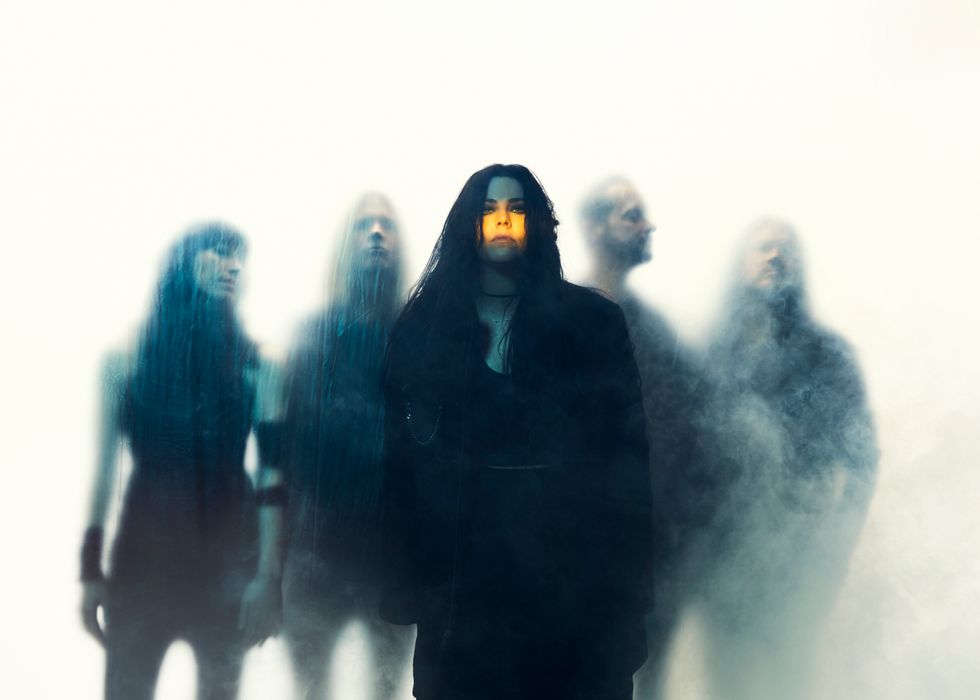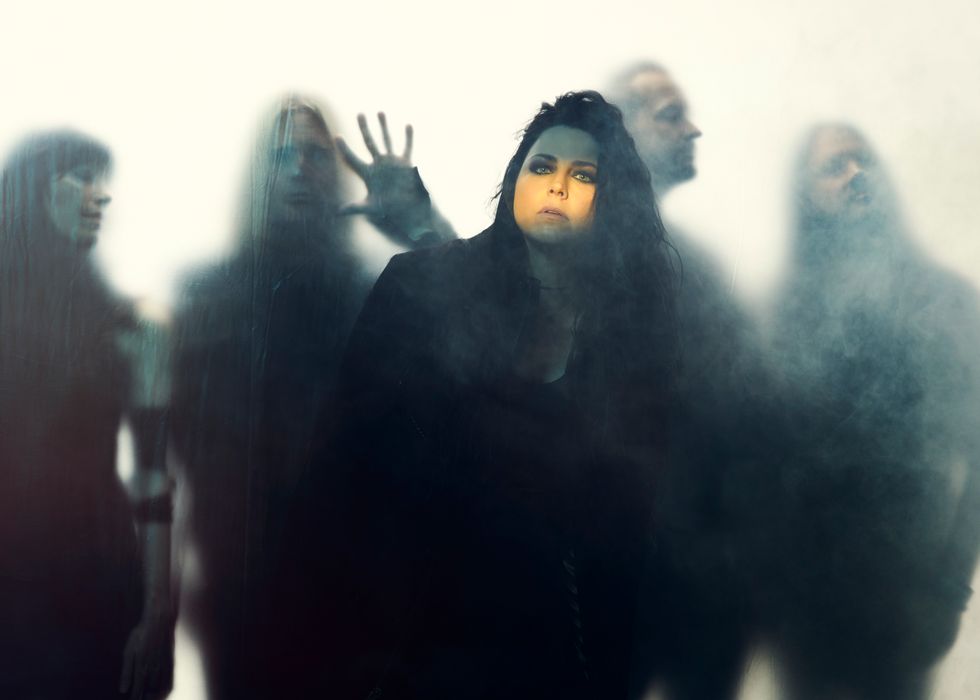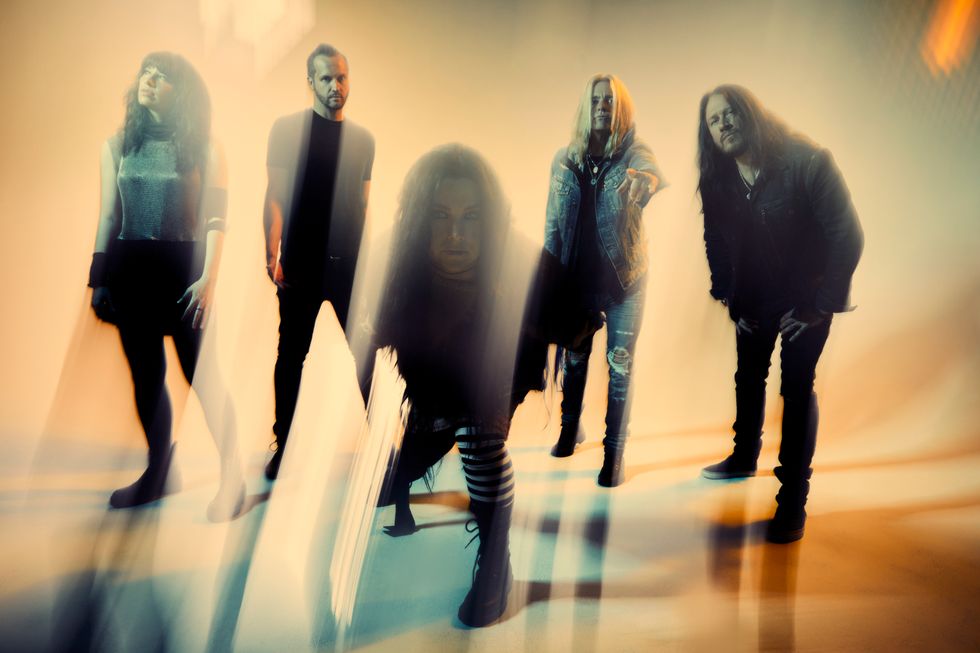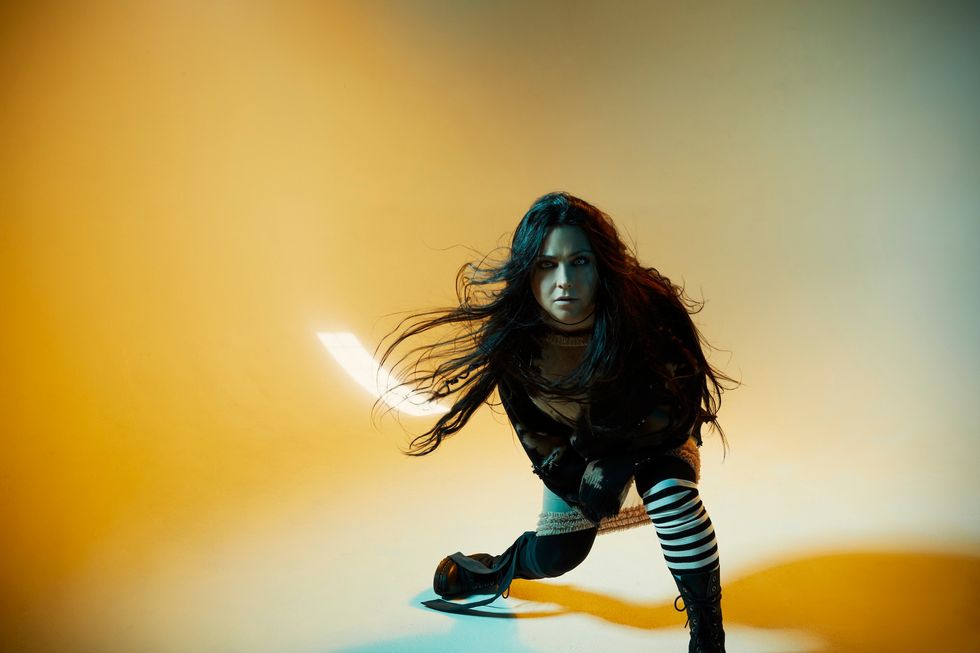
Time Traveling With Evanescence's Amy Lee
Nov 27, 2023
According to Amy Lee, the voice behind Evanescence’s larger-than-life sound, understanding the impact of the band’s seismic 2003 release Fallen is something that has only happened with time. “I don't think there's any way you can understand the magnitude of your life from a 21-year-old's perspective,” Lee tells PAPER. “The greatest gift of getting older is being able to appreciate the moment you're in or what you had.”
It was two decades ago that the Arkansas-born rock band released their debut album and introduced the world to their signature sound of symphonic melodies meets metal, all delivered with Lee’s emotive pristine vocals. The band dispatched a medley of hits with Fallen, including the heartbreaking piano ballad “My Immortal,” and the Grammy-award-winning cinematic love song, “Bring Me To Life.” The album peaked at No. 3 on the Billboard Top 200 chart and to this day remains one of the best-selling LPs of all time. Released at a time when nu-metal and post-grunge male-dominated rock ruled the airwaves, the young band’s success not only shifted the trajectory of their personal lives but inspired a slew of other female-fronted acts to follow in their footsteps.
Now, the band is celebrating two decades of music with the deluxe reissue of Fallen, an album Lee describes as “the soundtrack to first loves, epic heartbreak, self-realization, wedding days, last goodbyes, friendships and countless other moments in so many lives.” Revisiting the creation of their first release has felt like cathartic time-traveling for Lee — reminding her of who and where she was when she first dreamt about the career she has today. “I definitely put my whole heart and spare time into music at the time,” she says. “I obsessed over it. I hadn't heard the word manifesting back then but I visualized it happening and acted like it would happen and it did.”
Despite the dream coming true, the band’s achievements didn’t happen without more than a few trials and tribulations. “It was due to so many factors lining up at the same time,” Lee explains. “I feel very fortunate that it worked out the way it did all these years later. Through all the highs and lows, ups and downs, knock-down drag-out fights everything came from love for the music and for our fans.”
Here, Lee talks to PAPER about Evanescence’s critically acclaimed debut, the most impactful memories of the past 20 years and her hopes for the future.

Fallen came out during a time when most of the band’s were male-fronted and dominated. How did you deal with the challenge of being one of the only female-fronted bands on the charts at the time?
I definitely felt it. I didn't have a group of friends that all liked Korn and Soundgarden, I was on my own and I spent a lot of time on my own. I would just be at home working on my music and I did feel like [Evanescence] was this unique idea. One of the things that was so exciting was this feeling that we were on to something new, there weren’t a ton of people lined up dying to put film scores and hard rock and metal together. It was kind of like we discovered that this is something that works and were like, "Let's do this." I also grew up in the alternative scene being at this incredible peak in the ‘90s where the weirder and more unique the music was the cooler it was. So to me the fact that it felt like we were doing something different just [confirmed that it was good].
Speaking of doing something new and different, I'm sure that your success inspired a lot of other artists who saw a woman fronting a band and felt like they could do it too. Do you recognize any through-lines from Evanescence to current acts and realize they may have not existed without your band?
It's humbling. It's hard for me to say that out loud. But yeah, I know it more because of all the young artists I've spoken to that have come to me and expressed that same feeling of You did it so I knew I could do it. They're their own people with their own art and their own ideas but they have a point of reference to say this is possible. Obviously, I had those references in my life too, I looked up to a lot of female rock artists and alternative artists in the '90s. The hard rock music landscape was very male-dominated when we came out, and yeah, it was a challenge. I felt the challenge. It made me a fighter. At the same time, I always saw it as sort of like, "Well screw it look at it as positive we're gonna stand out if nothing else".It felt like if they give us the chance to be up here and be on stage, then we'll show them what we've got and it has nothing to do with gender.

Who were some of those artists you mentioned listening to in the '90s that inspired you to make music?
Shirley Manson [of Garbage] was one of my heroes, for sure. I can say that I have met her several times in my life and she is absolutely as awesome as I had dreamed. Bjork is one of my all-time favorite artists, just completely unique and innovative and creative and talented. Rock girls like Verruca Salt are so amazing. I just recently went on a deep dive, and I was showing the music to the guys in the band. I was like, "Do you know songs besides 'Seether'?" And they're like, "Not really," so I was like, let's listen to their second album right now. My guitar player was obsessed.
Going back to Fallen, I did want to ask about these massive songs from the album like "My Immortal" to "Going Under" and of course, "Bring Me To Life". When you go back and perform these after so much time has passed, have they changed in meaning for you at this point?
Of course, and they change all the time. I think it's one of those things where, especially when it's written in a somewhat universal, timeless way, where it isn't so specific all the time, it's open for interpretation depending on whatever is going on [in my life]. One song can have 100 different meanings for everyone. But also, the way that they are performed after playing them for 20 years, they've grown and continued to grow. It's funny because you record a song, pretty much right after you finish it and you're still making decisions as you record it. That recorded version is forever, but at the same time, it's never over. When we're playing them live, and we think of a better way or a way that makes more sense with the crowd, or we elongate this part, you build on that over the years, so the [live version] is the way the song sounds in my head. It's interesting to listen to album versions because they're so different. My immortal is taken on a whole new meaning for me with our history with our fans and our journey together.

Can we dig into the changing meaning of "My Immortal"? What's the story that you feel has come to life over these two decades?
In my life alone, from the beginning of singing that song in front of people, which was before 2000, so 20 years of life I've lived with that same song and that purifying connection through everybody singing. It's always a sing-along, everybody lifting their hearts up and singing along, especially something that feels, you know, like, it's about loss. It represents 20 years worth of life and love and loss, and humanity and connection in my personal story and I can feel that that's true for a lot of people. When we're doing that together, they're not just living in the moment, they're experiencing this throughline of this song being a part of their life for such a long time. It's just cool to be able to feel that together. You can't just write a new song and instantly have it have that weight. The weight has to do with time.
Looking at the passing of time, so many of the people singing along to songs like "My Immortal" are not just fans that were there in the beginning but new fans. What is that live experience like? What's it like to witness the impact you've had on generations of listeners in real-time?
It definitely leaves me to existential thinking. This is bigger than me, you know? I'm really grateful to be a part of it. I feel like I've been able to be a part of something that is a lot bigger than myself, and it's hard to sum up in like a word or two what that feels like, but it feels like love.

Has revisiting your first album felt at all healing or cathartic? What was this process like, emotionally?
I don't spend a lot of time anymore thinking too much about back then. I mean, [I do visit it] in the sense of the music and the songs that have stayed with us that we play every night but deep thoughts about where I was at in that specific span of time that's not where I live now. I definitely dug up some old resentments and feelings of frustration and there was a lot going on, but at the same time, the innocence of it all is really precious. I think that there's something about that that makes Fallen great for me. It wasn't some intentional thing on my end it was just learning and processing. For the most part it's a pretty good effort for you know, a 20-year-old. But yes, it was a good and healing journey.
Now that you've shared the deluxe re-release, what are you most excited to share with fans next?
We just finished tour and I was playing the piano right before we had to start our call so I am feeling so ready to be creative. New music will be coming. I don't know when but we're all feeling itchy fingers though.
One more question, which is a little time traveling. If you could go back to the version of you that created Fallen and you could offer her any piece of advice, what would you tell her?
[Laughs] So many notes. More than anything, I think what I would want to do is just tell her it's gonna be okay. Don't worry, you're gonna be okay. You're doing great. You're doing fine. Don't stress out. You belong where you are. Because I think that's the biggest thing is just feeling like am I making the right decision? Is this even me? Am I just a big poser? No, you're fine. You're following your art. Keep it up. It's gonna be great.
Photography: Travis Shinn
From Your Site Articles
Related Articles Around the Web
MORE ON PAPER
ATF Story
Madison Beer, Her Way
Photography by Davis Bates / Story by Alaska Riley
Photography by Davis Bates / Story by Alaska Riley
16 January
Entertainment
Cynthia Erivo in Full Bloom
Photography by David LaChapelle / Story by Joan Summers / Styling by Jason Bolden / Makeup by Joanna Simkim / Nails by Shea Osei
Photography by David LaChapelle / Story by Joan Summers / Styling by Jason Bolden / Makeup by Joanna Simkim / Nails by Shea Osei
01 December
Entertainment
Rami Malek Is Certifiably Unserious
Story by Joan Summers / Photography by Adam Powell
Story by Joan Summers / Photography by Adam Powell
14 November
Music
Janelle Monáe, HalloQueen
Story by Ivan Guzman / Photography by Pol Kurucz/ Styling by Alexandra Mandelkorn/ Hair by Nikki Nelms/ Makeup by Sasha Glasser/ Nails by Juan Alvear/ Set design by Krystall Schott
Story by Ivan Guzman / Photography by Pol Kurucz/ Styling by Alexandra Mandelkorn/ Hair by Nikki Nelms/ Makeup by Sasha Glasser/ Nails by Juan Alvear/ Set design by Krystall Schott
27 October
Music
You Don’t Move Cardi B
Story by Erica Campbell / Photography by Jora Frantzis / Styling by Kollin Carter/ Hair by Tokyo Stylez/ Makeup by Erika LaPearl/ Nails by Coca Nguyen/ Set design by Allegra Peyton
Story by Erica Campbell / Photography by Jora Frantzis / Styling by Kollin Carter/ Hair by Tokyo Stylez/ Makeup by Erika LaPearl/ Nails by Coca Nguyen/ Set design by Allegra Peyton
14 October




